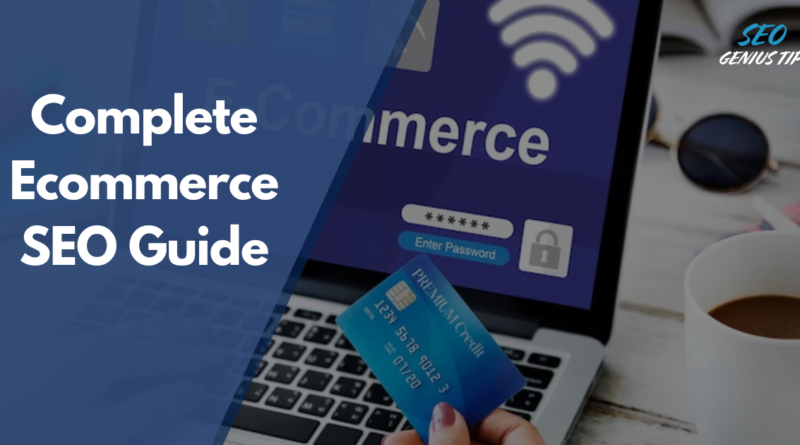Complete Ecommerce SEO Guide for 2024 | Trends and Importants
Ecommerce, the digital marketplace where businesses thrive or falter based on their online visibility, underscores the critical importance of Ecommerce SEO, a strategic dance with search engines that can make or break an online store. In the sprawling landscape of the internet, being discovered is akin to being placed on the digital mainstage, and Ecommerce SEO is the key to securing that coveted spotlight.
Picture it as a dynamic orchestra of keywords, website structure, and user experience, harmonizing to attract the attention of potential customers scouring the web for products and services. It’s not merely about being seen; it’s about creating a lasting presence that transcends immediate transactions, cultivating trust and loyalty.
The significance of Ecommerce SEO becomes evident in its ability to transform a virtual storefront into a perpetual engine of growth. The magic lies in understanding the language of both search engines and human users, optimizing product pages, and embracing the latest trends shaping the digital realm in 2024.
Beyond technical complexities, our guide explores crafting an online shopping experience that resonates. Navigating the realms of WooCommerce’s flexibility or Shopify’s streamlined paths, we demystify Ecommerce SEO, providing tools to conquer online marketplace challenges. Welcome to where Ecommerce meets SEO, shaping your success story. Whether you’re managing on WooCommerce or enjoying Shopify’s simplicity, our guide is your companion.
Dive into our blog for practical tips to elevate your venture – it’s time to shine in the online spotlight!
Table of Contents
What is Ecommerce SEO?
Ecommerce SEO, or Search Engine Optimization, is the strategic process of optimizing an online store’s digital presence to enhance its visibility in search engine results pages (SERPs). At its core, it’s about ensuring that when potential customers search for products or services relevant to your online store, your website appears prominently in their search results. The key objective is to attract organic (non-paid) traffic, increase the likelihood of conversions, and ultimately boost revenue.
Central to Ecommerce SEO is the meticulous selection and implementation of keywords – the words and phrases users are likely to type into search engines when looking for products you offer. Effective keyword optimization involves aligning these terms with your product descriptions, meta tags, and overall website content, signaling to search engines that your online store is a reliable and relevant source.
Beyond keywords, Ecommerce SEO extends its reach to various elements of your online presence. This includes optimizing product pages with compelling and informative content, ensuring a user-friendly website structure, and incorporating elements that enhance the overall user experience. Factors like page load speed, mobile responsiveness, and secure transactions contribute not only to SEO rankings but also to customer satisfaction.
In essence, Ecommerce SEO is the compass guiding your online store through the vast landscape of the internet. It’s about making your digital storefront not only visible but appealing and trustworthy to both search engines and potential customers. As the digital marketplace continues to evolve, a well-executed Ecommerce SEO strategy becomes indispensable for staying competitive, attracting the right audience, and carving a successful niche in the dynamic world of online commerce.
Importance of SEO for Ecommerce Websites
In the bustling world of online commerce, where countless digital storefronts compete for attention, the significance of Search Engine Optimization (SEO) for Ecommerce websites cannot be overstated. SEO is the linchpin that bridges the gap between virtual visibility and business success. It goes beyond being a marketing tool; rather, it serves as a guiding force that propels Ecommerce ventures to the forefront of search engine results, ensuring sustained growth, customer trust, and competitive resilience.
This exploration delves into the pivotal role Ecommerce SEO plays in the digital success story of Ecommerce websites, unraveling its multifaceted impact on visibility, credibility, and overall business prosperity.
1. Enhanced Visibility and Discoverability: SEO acts as the beacon that guides potential customers to Ecommerce websites, ensuring that these digital storefronts are prominently displayed in search engine results when users seek relevant products or services.
2. Increased Organic Traffic: By optimizing for specific keywords, Ecommerce SEO attracts organic traffic, reducing dependence on paid advertising and establishing a sustainable flow of potential customers genuinely interested in what the online store offers.
3. Trust and Credibility Building: High search engine rankings instill trust in online shoppers, positioning Ecommerce websites as authoritative and reliable sources. This trust is a catalyst for customer loyalty and repeat business.
4. Competitive Edge: In a crowded digital marketplace, SEO provides Ecommerce businesses with a competitive edge, enabling them to outshine rivals and secure a more significant share of the market.
5. Cost-Effective Marketing: SEO proves to be a cost-effective long-term investment, offering continuous returns as opposed to the transient visibility provided by paid advertising. It is a sustainable strategy for driving traffic and conversions.
6. Improved User Experience: SEO involves optimizing the technical aspects of a website, leading to an improved user experience. A seamless, user-friendly interface enhances customer satisfaction and encourages repeat visits.
7. Global Reach: Ecommerce SEO breaks down geographical barriers, allowing online stores to reach a global audience. This expansion of reach opens new avenues for growth and revenue generation.
8. Adaptability to Algorithm Changes: Staying updated on SEO best practices ensures that Ecommerce websites can adapt to search engine algorithm changes, maintaining or improving their rankings over time.
9. Conversion Rate Optimization: Ecommerce SEO strategies focus on optimizing product pages, making them more relevant and appealing to potential customers, ultimately contributing to increased conversion rates and sales.
10. Analytical Insights for Continuous Improvement: Leveraging SEO analytics provides valuable insights into user behavior, preferences, and trends. This data-driven approach empowers Ecommerce businesses to make informed decisions, fostering continuous improvement and strategic growth. In conclusion, the importance of SEO for Ecommerce websites lies not just in achieving higher rankings but in creating a robust, trustworthy, and customer-centric online presence that propels businesses toward sustained success in the dynamic digital landscape.
Complete Ecommerce SEO Guide in 2024
1. Keyword Research
The cornerstone of Ecommerce SEO, keyword research is the compass guiding your content strategy. By understanding the language your potential customers use when searching for products, you can align your website’s content with their intent. Tools like Google Keyword Planner and SEMrush empower businesses to unearth high-value keywords, ensuring that your online store speaks the same language as your target audience.
2. Competitive Analysis
In the competitive arena of online commerce, learning from your competitors is a strategic advantage. Conducting a thorough analysis of competitors’ Ecommerce SEO strategies unveils valuable insights into industry trends, target keywords, and content creation approaches. This competitive intelligence informs your own strategy, enabling you to differentiate your online store and stand out in a crowded digital marketplace.
3. Optimize Product Pages
Transforming product pages into compelling showcases is an art that merges creativity with strategic optimization. By infusing product descriptions with relevant keywords and emphasizing unique selling propositions, you not only enhance search engine visibility but also captivate potential customers. High-quality images and multimedia elements further enrich the user experience, turning each product page into a digital masterpiece.
4. Technical SEO
Technical SEO forms the backbone of a well-optimized Ecommerce website. Site speed, crawlability, and logical site structure are crucial components. By addressing technical aspects like schema markup implementation and ensuring mobile responsiveness, you create a solid foundation that enhances search engine recognition and improves overall user satisfaction.
5. User Experience (UX)
A positive user experience is paramount in converting visitors into loyal customers. From the initial landing page to the seamless checkout process, optimizing for smooth navigation, intuitive design, and a secure transaction process fosters customer satisfaction. Prioritizing a positive UX not only enhances conversion rates but also contributes to brand loyalty and repeat business.
6. Mobile Optimization
As mobile usage continues to surge, optimizing your Ecommerce site for mobile devices is not just a choice; it’s a necessity. Responsive design, fast-loading pages, and an intuitive mobile interface ensure that you capture the attention of the ever-growing mobile audience. Mobile optimization is a pivotal aspect of Ecommerce SEO, considering the shift in consumer behavior toward handheld devices.
7. Content Marketing
Beyond product listings, content marketing is a powerful tool to educate and engage your audience. Blog posts, how-to guides, and industry insights not only attract organic traffic but also position your brand as an authority in your niche. Engaging content fosters customer trust, encourages repeat visits, and contributes to a robust Ecommerce SEO strategy.
8. Internal Linking
Strategic internal linking within your website guides visitors seamlessly through their online journey. By incorporating internal links, you not only enhance navigation but also distribute link equity across various pages, boosting overall site authority. This contributes significantly to improved search engine rankings and a better user experience.
9. External Link Building
Elevating your Ecommerce site’s credibility involves external link building. High-quality backlinks from reputable sources within your industry are essential. Engaging in guest posting, collaborating with influencers, and fostering relationships with authoritative websites contribute to building your site’s authority, a crucial factor in successful Ecommerce SEO.
10. Social Media Integration
Integrating your Ecommerce site with social media platforms is a strategic move to amplify your reach. Sharing products, engaging with your audience, and encouraging user-generated content on social media contribute to increased visibility. Social signals, such as likes and shares, play a role in search engine algorithms, making social media integration a valuable aspect of Ecommerce SEO.
11. Reviews and Testimonials
Customer trust is a cornerstone of successful Ecommerce, and reviews and testimonials play a pivotal role in building that trust. Encourage customers to leave reviews and showcase testimonials on your Ecommerce site. Positive reviews not only enhance your online reputation but also contribute to local SEO efforts. Responsively addressing both positive and negative reviews demonstrates active engagement with your customer base, fostering trust and credibility.
12. Secure Website
Ensuring the security of your Ecommerce website, especially during transactions, is paramount for building and maintaining customer trust. Obtaining an SSL certificate not only protects customer data but also positively influences search engine rankings. A secure website is a fundamental element of a trustworthy and customer-centric Ecommerce SEO strategy.
13. Monitor Analytics
Leveraging website analytics, particularly tools like Google Analytics, is crucial for data-driven decision-making. Regularly monitor user behavior, track popular products, and understand the effectiveness of your Ecommerce SEO strategies. This insightful analysis provides actionable data for continuous improvement and strategic decision-making, ensuring your Ecommerce site stays ahead in the competitive digital landscape.
14. Stay Updated
The digital landscape is dynamic, with search engine algorithms evolving and Ecommerce SEO trends shifting. Staying updated on these changes is essential for adapting your Ecommerce SEO strategy. Regularly update your knowledge on algorithm changes, emerging technologies, and industry best practices to ensure your online store remains competitive and responsive to the latest trends.
15. Local SEO
Optimizing your Ecommerce site for local searches is a strategic approach to tapping into local markets. Claim and optimize your Google My Business listing, use location-specific keywords, and encourage local customer reviews. Local SEO efforts enhance visibility for users searching within specific geographic areas, enabling your Ecommerce site to connect with local audiences effectively.
In this Ecommerce SEO guide delves into each critical aspect, providing a comprehensive framework for navigating the complexities of the digital marketplace. By combining strategic insights, data-driven decision-making, and a commitment to continuous improvement, your online store can not only meet but exceed the expectations of search engines and, more importantly, your customers. This guide is your companion in the journey to Ecommerce SEO mastery, empowering your business to thrive in the ever-evolving world of online commerce.
Ecommerce Website On-Page SEO – A Comprehensive Guide
In the ever-evolving landscape of online commerce, mastering On-Page SEO for Ecommerce websites is a crucial component of achieving sustained visibility and success. On-Page SEO involves optimizing individual pages of a website to enhance its search engine rankings and improve user experience. This comprehensive guide delves into the intricacies of Ecommerce On-Page SEO, unraveling the key principles and providing a roadmap for Ecommerce businesses to optimize their websites effectively.
1. Keyword Research and Optimization
The cornerstone of On-Page SEO is strategic keyword research. Ecommerce websites must identify relevant and high-converting keywords for their products. Optimizing product titles, descriptions, and meta tags with these keywords enhances the page’s visibility in search results, ensuring it aligns with the search intent of potential customers.
2. Compelling Product Descriptions
Crafting compelling and unique product descriptions not only helps potential buyers make informed decisions but also contributes to higher search engine rankings. Descriptions should be detailed, engaging, and naturally incorporate relevant keywords to appeal to both users and search engines.
3. User-Friendly URL Structures
Ecommerce websites should maintain clean and user-friendly URL structures. Descriptive and concise URLs not only aid in user navigation but also contribute to search engine understanding of the page’s content. Avoiding generic parameters and incorporating relevant keywords in URLs can positively impact On-Page SEO.
4. Optimized Product Images
Visual appeal is integral to Ecommerce, and optimizing product images is vital for both user experience and On-Page SEO. Use descriptive file names, include alt text with relevant keywords, and ensure images are compressed for faster loading times, enhancing both user satisfaction and search engine favorability.
5. Mobile Responsiveness
With the increasing prevalence of mobile users, ensuring Ecommerce websites are mobile-responsive is paramount. Search engines prioritize mobile-friendly websites in their rankings. Responsive design not only caters to a broader audience but also positively influences search engine algorithms.
6. Internal Linking
Strategic internal linking improves website navigation, distributes page authority, and enhances the overall user experience. Linking relevant product pages together and creating a logical site structure helps search engines understand the hierarchy and importance of different pages within the Ecommerce website.
7. Customer Reviews and Ratings
Integrating customer reviews and ratings on product pages not only builds trust but also contributes to On-Page SEO. Search engines value fresh and relevant content, and user-generated reviews provide just that. Positive reviews can influence potential customers and boost the credibility of the Ecommerce website.
8. Page Load Speed Optimization
Page load speed directly impacts user satisfaction and search engine rankings. Slow-loading pages can lead to higher bounce rates and decreased visibility in search results. Compressing images, utilizing browser caching, and optimizing code are essential steps to ensure swift page load times.
9. Schema Markup Implementation
Incorporating schema markup provides additional context to search engines about the content on a page. For Ecommerce websites, implementing product schema markup helps search engines understand product details, prices, and availability, enhancing the chances of rich snippets in search results.
10. Secure and Accessible Checkout Process
The checkout process is a critical component of Ecommerce On-Page SEO. A secure and accessible checkout page not only instills trust in customers but also positively influences search engine rankings. Ensuring a seamless and straightforward checkout experience contributes to overall user satisfaction and conversion rates.
Ecommerce On-Page SEO is a dynamic and multifaceted strategy that requires meticulous attention to detail. By implementing these ten key principles, Ecommerce websites can not only enhance their search engine visibility but also provide an optimized and satisfying user experience. As the digital marketplace continues to evolve, staying attuned to On-Page SEO best practices becomes a cornerstone for Ecommerce success, propelling businesses toward sustained growth and prominence in the competitive online arena.
Ecommerce Website Off-Page SEO
In the dynamic world of online commerce, where the competition is fierce and the digital landscape ever-expanding, Off-Page SEO emerges as the powerhouse that propels Ecommerce websites into the spotlight. Off-Page SEO focuses on optimizing elements outside the website itself to enhance its online authority, credibility, and visibility. This comprehensive guide delves into the intricacies of Ecommerce Off-Page SEO, uncovering the essential strategies and providing a roadmap for Ecommerce businesses to navigate the digital realm successfully.
1. Quality Backlink Building
At the heart of Off-Page SEO lies the art of building quality backlinks. Earning links from reputable and relevant websites is crucial for establishing the authority of an Ecommerce site in the eyes of search engines. These backlinks act as digital votes of confidence, signaling to search algorithms that the website is a trusted source.
2. Social Media Engagement
Active engagement on social media platforms is a pivotal Off-Page SEO strategy. Ecommerce businesses should harness the power of social media to share content, connect with their audience, and promote their products. Social signals, such as likes, shares, and comments, contribute to the website’s credibility in search engine algorithms.
3. Influencer Collaborations
Partnering with influencers in the Ecommerce niche can significantly impact Off-Page SEO. Influencers bring credibility and visibility to the brand, creating a ripple effect as their followers engage with and share Ecommerce content. This collaborative approach contributes to a broader digital footprint and increased brand awareness.
4. Online Brand Mentions
Monitoring and encouraging online brand mentions, even without direct links, is a subtle yet impactful Off-Page SEO strategy. Search engines consider brand mentions as indicators of authority and relevance, positively influencing the website’s rankings.
5. Guest Blogging
Strategic guest blogging on reputable websites in the Ecommerce industry can provide valuable backlinks and exposure. Ecommerce businesses can share their expertise, showcase products, and establish themselves as authorities within their niche, enhancing both credibility and Off-Page SEO.
6. Online Reviews and Reputation Management
Encouraging positive online reviews and managing the brand’s reputation are integral Off-Page SEO practices. Search engines value user-generated content, and positive reviews contribute to the overall trustworthiness of an Ecommerce website.
7. Forum and Community Participation
Active participation in relevant forums and online communities allows Ecommerce businesses to build relationships, share insights, and subtly promote their products. Engaging in conversations within these communities not only establishes authority but also contributes to Off-Page SEO through contextual links.
8. Local SEO Strategies
For Ecommerce businesses with physical locations or a specific target audience, implementing local SEO strategies is essential. Optimizing for local searches, creating Google My Business profiles, and garnering positive local reviews contribute to Off-Page SEO by enhancing the website’s local visibility.
9. Content Marketing Collaborations
Collaborating with other content creators in the Ecommerce space amplifies the reach of a website’s content. Joint ventures, co-authored pieces, or content partnerships can lead to cross-promotion, expanding the digital footprint and positively impacting Off-Page SEO.
10. Continuous Monitoring and Adaptation
Off-Page SEO is an ongoing process that requires continuous monitoring and adaptation. Regularly analyzing the website’s backlink profile, tracking online mentions, and staying attuned to industry trends are essential to ensure sustained Off-Page SEO success.
Ecommerce Off-Page SEO is a dynamic and strategic dance with the digital world, where building authority and credibility are paramount. By implementing these ten key strategies, Ecommerce websites can not only enhance their online presence but also solidify their position as trusted and influential players in the competitive online marketplace. In a landscape where digital growth is synonymous with success, Off-Page SEO becomes the compass guiding Ecommerce businesses toward sustained prominence and unparalleled success.
Ecommerce Website Technical SEO
In the intricate web of online commerce, where the success of an Ecommerce website hinges on digital visibility and user experience, Technical SEO takes center stage. This facet of SEO delves into the backend intricacies, ensuring that the digital infrastructure is not just search engine-friendly but optimized for peak performance. This concise guide explores the key tenets of Ecommerce Technical SEO, providing essential strategies for businesses to fortify their digital foundations.
1. Website Speed Optimization
The loading speed of an Ecommerce website is a critical factor influencing user satisfaction and search engine rankings. Technical SEO involves optimizing images, leveraging browser caching, and minimizing code to enhance website speed. A faster website not only improves user experience but also earns favor with search engines.
2. Mobile Responsiveness
With an increasing number of users accessing websites through mobile devices, ensuring mobile responsiveness is paramount for Technical SEO. Ecommerce websites must offer a seamless experience across various screen sizes, contributing to improved rankings in mobile search results.
3. Crawlability and Indexability
Technical SEO involves optimizing a website’s structure to facilitate easy crawling by search engine bots. A well-organized sitemap, clear URL structures, and the strategic use of robots.txt directives ensure that search engines can effectively crawl and index the website’s content.
4. Canonicalization
Managing duplicate content is crucial for Technical SEO. Canonicalization involves specifying the preferred version of a page to search engines, preventing issues related to duplicate content that could negatively impact search rankings.
5. Schema Markup Implementation
Integrating schema markup is a Technical SEO tactic that provides additional context to search engines about the content on a page. For Ecommerce websites, implementing product schema markup enhances search engine understanding of product details, prices, and availability.
6. SSL Encryption and Security
Security is a fundamental aspect of Technical SEO. Ecommerce websites must implement SSL encryption to ensure secure data transfer between the user’s browser and the website server. Search engines prioritize secure websites, and SSL certification positively influences search rankings.
Ecommerce Technical SEO is the silent architect behind a robust and efficient online presence. By focusing on website speed, mobile responsiveness, crawlability, canonicalization, schema markup, and security, businesses can lay a strong foundation that not only pleases search engines but also enhances the overall user experience. In a digital landscape where technical excellence is synonymous with online success, mastering Technical SEO becomes a pivotal strategy for Ecommerce websites looking to thrive in the competitive online marketplace.
Ecommerce SEO Trends for 2024

In the ever-evolving landscape of online commerce, staying ahead of the curve is not just an aspiration but a necessity. As we step into 2024, Ecommerce businesses find themselves navigating a digital realm shaped by emerging trends in Search Engine Optimization (SEO). These trends are more than mere shifts; they represent the future of Ecommerce SEO, influencing how online stores are discovered, engaged with, and ultimately, converted into successful ventures. This comprehensive guide unravels the top 10 Ecommerce SEO trends for 2024, providing businesses with insights and strategies to propel their online presence into the future.
1. Voice Search Optimization
The proliferation of voice-activated devices has ushered in a new era for search behavior. In 2024, the trend of using voice commands for online searches is set to soar. Ecommerce websites need to optimize their content for conversational queries, focusing on natural language and long-tail keywords to align with the way people speak rather than type.
2. Video SEO Dominance
As visual content continues to dominate online platforms, video SEO emerges as a pivotal trend in 2024. Ecommerce businesses are increasingly leveraging video content, from product demonstrations to storytelling. Optimizing videos for search engines through keyword-rich titles, descriptions, and transcripts becomes crucial for enhanced visibility and engagement.
3. Mobile-First Indexing
Mobile devices are the primary gateway to the digital world, and search engines are pivoting toward a mobile-first approach. In 2024, Ecommerce websites must prioritize mobile optimization not only for user experience but also for search engine rankings. Mobile-friendly design, fast-loading pages, and responsive interfaces are imperative for success.
4. Artificial Intelligence (AI) and Machine Learning (ML)
The integration of AI and ML technologies in search algorithms is reshaping the Ecommerce SEO landscape. Search engines are becoming smarter, understanding user intent, and delivering more personalized results. Ecommerce websites can leverage these technologies for predictive search suggestions, personalized content recommendations, and improved user experience, all of which contribute to higher search rankings.
5. User Experience Signals
User experience signals, such as dwell time, bounce rate, and click-through rate, are gaining prominence in search engine algorithms. In 2024, Ecommerce websites must prioritize creating an intuitive and user-friendly experience. High-quality content, clear navigation, and fast-loading pages contribute not only to user satisfaction but also to improved search rankings.
6. Core Web Vitals
Google’s emphasis on Core Web Vitals continues to be a significant trend in 2024. These metrics, including loading speed, interactivity, and visual stability, directly impact user experience. Ecommerce websites that prioritize optimizing Core Web Vitals are likely to see improved search rankings, ensuring their digital storefronts remain competitive.
7. Local SEO for Ecommerce
Local SEO is no longer solely for brick-and-mortar establishments. In 2024, Ecommerce businesses are tapping into the potential of local optimization to target specific regions, enhance visibility in local searches, and connect with their target audience on a more personalized level. This trend aligns with the growing demand for convenience and proximity in online shopping.
8. Featured Snippets and Zero-Click Searches
Featured snippets are becoming the go-to source for quick answers in search results, leading to an increase in zero-click searches. Ecommerce websites aiming for position zero in search results can optimize content to provide concise, informative answers to commonly asked questions, establishing authority and visibility in this changing search landscape.
9. Sustainability and E-A-T
Search engines are increasingly considering environmental, social, and ethical factors in their algorithms. E-A-T (Expertise, Authoritativeness, Trustworthiness) is a growing trend, emphasizing the importance of transparent, credible, and socially responsible practices. Ecommerce websites that align with these values are likely to garner favor from search engines and conscientious consumers.
10. Visual Search
The rise of visual search is reshaping how users discover products online. In 2024, Ecommerce SEO trends include optimizing images for search engines and implementing visual search functionalities on websites. By allowing users to search using images, Ecommerce businesses can enhance the user experience and tap into this emerging trend.
As we step into 2024, the realm of Ecommerce SEO is evolving at an unprecedented pace. These ten trends underscore the dynamic nature of digital commerce, challenging Ecommerce businesses to adapt, innovate, and embrace the future. Whether it’s optimizing for voice search, prioritizing video content, or aligning with sustainability principles, staying attuned to these trends is not merely an option but a strategic imperative for those seeking sustained success in the competitive online marketplace. By navigating these trends effectively, Ecommerce websites can not only thrive in the digital ecosystem of 2024 but also shape the future landscape of online commerce.
Summery
This comprehensive guide delves into the intricate realm of Ecommerce SEO, starting with the fundamentals and highlighting its paramount importance in navigating the fiercely competitive online marketplace. We explored the on-page strategies, emphasizing the significance of keyword optimization, compelling product descriptions, and mobile responsiveness. Off-page SEO took center stage, unveiling the power of quality backlink building, social media engagement, and reputation management for enhancing online authority. Technical SEO emerged as the silent architect, shaping a robust digital infrastructure through website speed optimization, mobile responsiveness, and security measures.
The guide then cast a gaze into the future, unraveling the top 10 Ecommerce SEO trends for 2024, including voice search optimization, video SEO dominance, and the integration of AI and machine learning. In essence, this guide equips Ecommerce businesses with a holistic understanding and practical strategies to not only thrive in the current digital landscape but also to navigate and influence the evolving future of online commerce.




